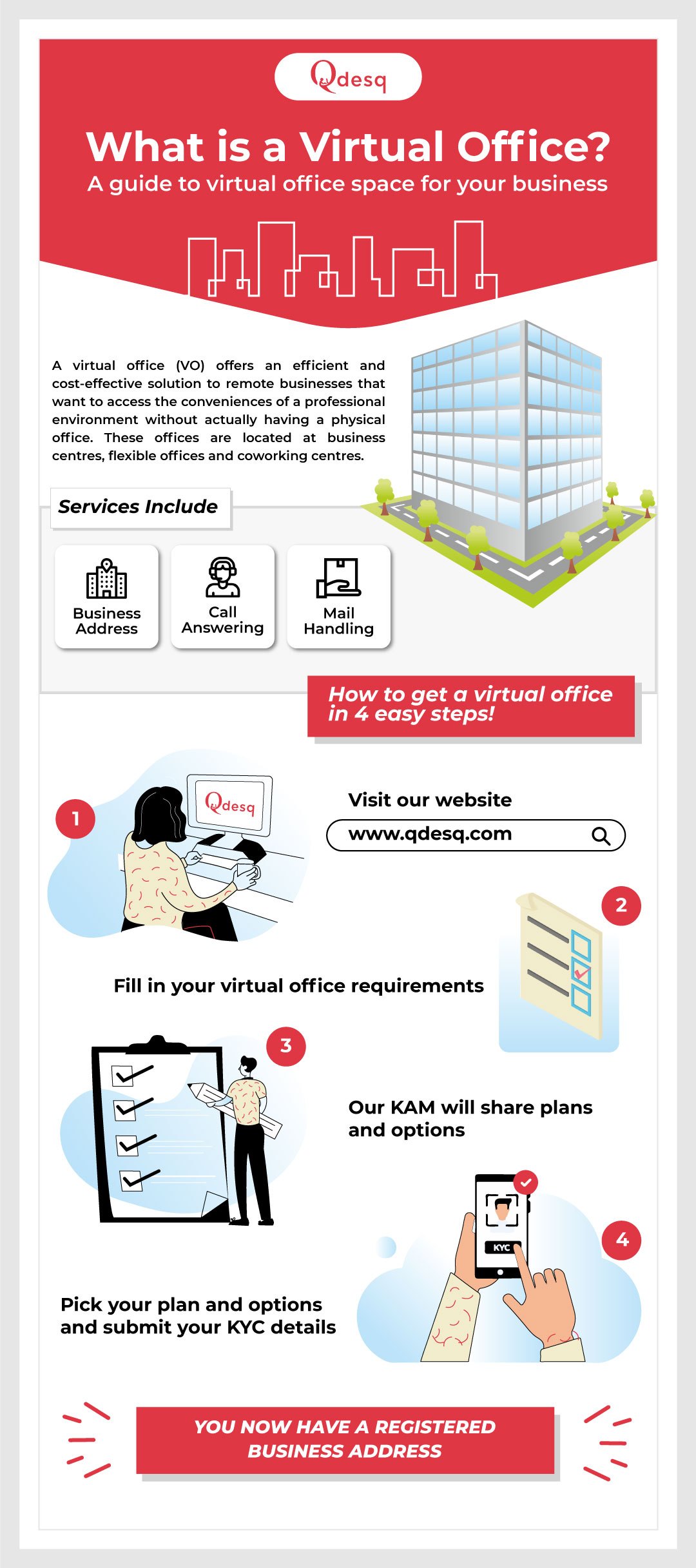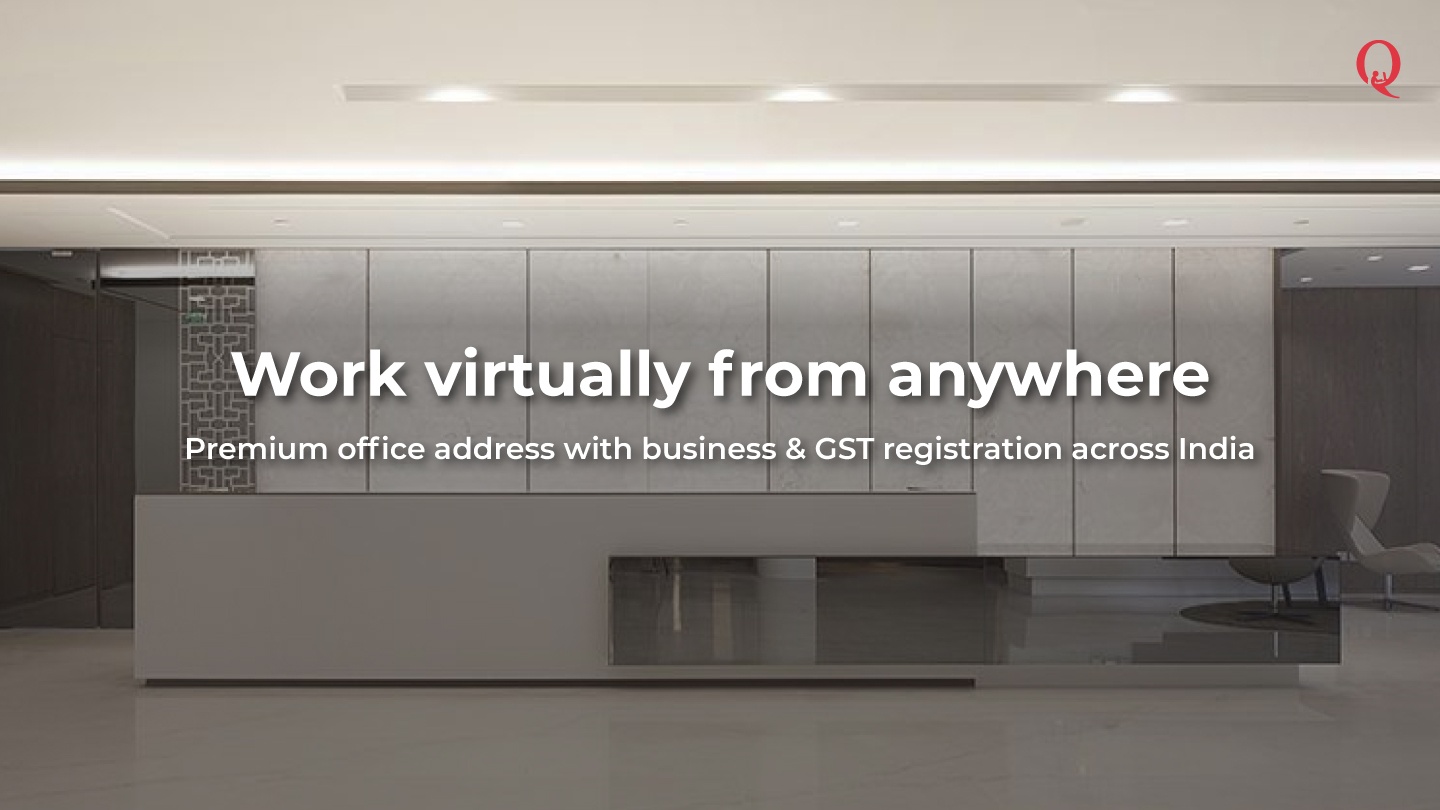Remote working has exploded widely since 2020 and is no more a niche trend. Although its explosion is sudden and unexpected, we are fortunate that this is happening at a time when we have an advanced communication system and technology to handle businesses. In fact, many businesses are rethinking their approach to physical office space as it becomes easier to work remotely.
A virtual office or a VO replaces the company’s need for a physical space but gives it a physical address and office-related services without the overhead of a long lease and administrative staff. The concept of virtual office is popular with both startups and multinationals because it offers its users the ability to add and subtract services, a la carte. Besides being affordable, it offers transactional and legal benefits. Since a virtual office operates as a collection of on-demand resources, it is as permanent or as fluid as is needed by its user.
The Covid-19 pandemic has caused a lot of coworking centers to offer virtual mail and address services as a way to bring in additional revenue besides their core business.
There is now a strong and well-established link between coworking and virtual offices, and many business centers and service offices already provide virtual office services.
Why Virtual Office?
- Flexibility
Since their conception, virtual offices have evolved with business requirements that go beyond the simple act of receiving mail. They provide additional services, like video conferencing, WiFi, whiteboards, catering services, combining the major features of coworking spaces and private mailboxes. Therefore, in most cases, they are potentially more useful for businesses than conventional offices.
Most virtual offices now have on-site conference rooms and workplaces which can be used on an hourly basis or reserved by the day. Startups and small businesses that want to minimize overhead, look at virtual offices to operate as one unit to serve customers but do not exist in a fixed location. Virtual office solution ensures a reputed work address without being physically tied to that location at all times.
- Cost effectiveness
Lean businesses focus primarily on hiring specialists to drive growth, and not that much on recruiting admin staff. The reduction in administrative costs is a big plus when a business is finding its feet and profits haven’t yet started to roll in. An established virtual business address and the dedicated assistance of a receptionist not only help in managing logistics but also release the financial strain that accompanies lengthy contracts or monthly bills.
- Credibility
While a full-blown office might be too expensive, a virtual office plants a flag for your brand in the location of your choice.
Well-paid freelancers as well as professionals like consultants who desire high flexibility, register their business with mailing/calling services. They prefer working from home rather than having a designated office. However, if they hail from a small town, their local address may cause a hindrance in their career to take-off. Having a virtual office address gives reassurance to their customers. Even big businesses looking to expand on a global scale are benefitted by a perceived presence in major cities as they appear credible to clients and investors.
- Productivity
Freedom from administrative tasks and commutes implies greater productivity. When every employee gets to work from a convenient location and the talent comes from every corner of the world without any restriction, the quality of work is bound to level up. Having said that, the number of distractions also increases when you work remotely, so virtual offices need to ensure a fine balance.
Services in Virtual Office
Combining all the advantages of virtual office space, the end result is ultimately greater customer engagement and satisfaction. While setting up virtual headquarters can pay dividends for businesses of all sizes, overlaying the benefits of a virtual office on the specific needs of your business and your customers is something you’ll need to pay close attention to. Evaluate your business to understand how suitable a virtual office is for you.
In India, a VO package includes many services that give your venture a professional and premium touch without digging a hole in your pocket, but would rather give a significant ROI.
- Registered business address
- Mail management
- Courier services
- Reception courtesy
- Answering telephone calls
- Access to meeting rooms
- Access to copier/scanner/fax
If you need to create a local presence in a new city, go for a basic virtual office plan that offers mail handling services.
If customer service is the lifeline of your business, your virtual office needs a live receptionist plan to function the best. Under this, the virtual receptionists take calls and answer client queries, however, if you operate in different time zones, you’ll need someone knowledgeable in your desired field who can take calls 24/7.
Be aware of VO providers acting outside law. The VO sector is a part of a recognized industry. Operators must ensure exactly who is using their address and services. This means every new client must complete proper documentation including a notarized CMRA form, without exception.
The costs of a virtual office can differ greatly, depending on your chosen city and provider. In terms of location, globally significant cities will cost more than regionally important ones. Likewise, pricing structures from virtual workspace providers can vary, so it’s important to really understand what you’re getting before you sign on the dotted line.
At Qdesq, we sold a total of 854 VOs till April 2020 and 71 VOs were closed across 13 Indian cities till April 2021. Some of the key strengths of Qdesq that gives it an edge, include:
- Large supply and enriched portfolio
- Unmatched expertise
- Zero brokerage
- Tech-enabled office platform for seamless booking process
- Easy invoicing due to single billing of all the cities
- Assistance to venue partners to create a supplement source of revenue
- Penetration through aggressive price points
- Q-shield badge for sanitized centers
The Road Ahead
Virtual offices serve small firms to successful ‘new-age’ businesses equally well. Companies are increasingly realizing that a static place of business is not necessary and adds unwanted cost to the business model. A larger business can use virtual offices to spread its branches. There can be minor issues with security as you are operating from a distant place but this can be easily eliminated using a better encryption service for your data.
Since many businesses may not want to pay for expensive serviced offices in future but won’t want to lose the prestige of a central city location, we can expect to see a further increase in popularity for virtual offices. Additionally, globalisation is putting extra pressure on every business to be where the money is.
Cities that were once smaller regional hubs are fast becoming international powerhouses. In these cities, virtual office locations will allow businesses to position themselves locally, without having to dilute workforces by placing them in ever more distant outposts.
Fortunately, virtual offices are the perfect response to this challenge. Your business gets to fly its flag in the best locations, you get to stay in an agile frame of mind, and you don’t have to lose sleep over expensive and impractical long-term rental agreements.

Moreover, 98% of workers want to continue working remotely for the rest of their career because it gives them flexibility and convenience. So we can expect to see more and more virtual offices popping up in the coming years.
The concept of a virtual office is growing in India, with many providers offering amazing services. Instead of finding a suitable physical space, it is easier and quicker to match your requirements on a flex marketspace like Qdesq.
MyBranch is among the few coworking spaces that have not only survived the pandemic but also grown in terms of revenue at 8 to10% over the Rs 7.70 crore in 2019-2020 and size with new centres in Vellore, Vizag and Hyderabad. It has also added customers in 22 cities. “We mainly work out of Tier II and III cities. The pandemic did not have a major impact in these cities except only recently. Businesses, from microfinance to insurance, were expanding to reach out to Tier II and III cities so growth in these cities was robust,” says Kushal Bhargava, co-founder of MyBranch. The company already has an order booked for opening another 10 locations and is in advanced talks with clients to add another 15 locations. Its older space in Pune caters to its sister concern Calibehr Business.
As with so many other things, in terms of office spaces too, it looks like the future is virtual.










